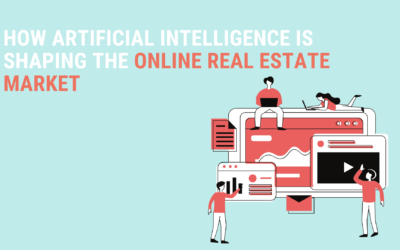The impact of COVID-19 on the online real estate market
25 June 2020 | 4 min read

The online real estate industry is changing due to technological improvements. We are going through a hard time because of Covid-19.
At Co-libry, we decided to have a Q&A with a couple of experts in the online real estate industry. We wanted to get some insights into how they combined the safety measures with their working atmosphere and which technological tools helped them during this period.
Here are the questions we asked:
- What impact did Covid-19 have on the way your company operates?
- Do you think those changes will be temporary or will they be a continuous part of your company?
- In which technologies did you have to fall back/in which new technologies did you have to invest?
- Does your company have any future plans or projects where you would have to rely on Artificial intelligence or other technologies?
- How do you see the future of the online real estate market?
EXPERT 1: MATTEO BOBBIO
Matteo Bobbio is a backend developer for a real estate portal situated in Italy.
This is what Matteo had to say:
In Italy, companies had to stay closed for a couple of months due to Covid-19. Almost everyone switched to teleworking. The sales department could only contact potential customers through the phone. Most of the changes will be temporary but we discovered that teleworking went well, this is a change we will continue to use in the future.
We make use of ‘virtual tours’ for the real estate. Those tours are a series of interactive 360-degree photos of the real estate in which the users can navigate freely.
In the future, we would like to use machine learning in one of our next projects and also an algorithm to evaluate real estates based on their information and the surroundings. In the final step, we want to call on our real estate agents. We would ask them, by using the tool, what the right price for a property would be in their opinion. Based on the responses, the system will be trained.
Portals are becoming more and more important to ‘catch’ potential customers and offer them the best choices of real estate. The real estate agent can’t and won’t be replaced. The ‘human touch’ is very important in this sector and can’t be replaced by a machine.
It is getting harder for a real estate agent to work without portals, but at the same time, it will become easier to work with us and with an always growing array of tools, services, and so on.
 EXPERT 2: MARIA FLORENCIA ZAMBIANCHI
EXPERT 2: MARIA FLORENCIA ZAMBIANCHI
Maria Florencia Zambianchi is a Digital Marketing executive who works for a company situated in Latin America.
In Latin America, the Covid-19 crisis has dramatically changed the work in the real estate sector. Realtors had to close their business, there was no activity and people couldn’t visit houses
Since last year, we have been implementing 360 technologies. For now, just a small group of sellers are using this technology and we hope to encourage more realtors to start using it. We try to visit every new listing with our Matterport camera. People worry more about how a property looks like. In the beginning, the 360-tool wasn’t a trend, but now it is. We noticed that this is a good technology to use, but at the end of the day, people want to see the property in real life.
I do believe this technology is here to stay. People in Latin America really need to see their house before they buy it. That’s why we try to encourage realtors to put as many pictures and videos as they can to showcase their listings.
We also started giving webinars to help realtors to optimize their listings and how they should be using more social media. People’s behavior is more browsy. They are still on the website but the conversion rate is lower. We really want to upgrade our recommendation system because we have noticed that people are using more and more social media. Through social media, we try to connect with our customers. The realtors communicate with the customers through WhatsApp.
In the future, we want to use email marketing, more visuals, and AI recommendation engines. Our data scientists are working really hard to improve learning models and our AI. We are also planning to keep using technologies like WhatsApp and 360-tours.
EXPERT 3: K. B.
K.B. is the Chief Product officer for an online real estate company situated in Turkey.
This is what he had to say:
Also in Turkey, we have suffered during the Covid-19 pandemic. We have launched a COVID support campaign which means zero payments to all customers, both new and existing, for 2 months. They have now 14 months of subscription instead of 12. As a result, our subscriber base jumped 15% within 1 month. The downside is that we sent 20% of staff to unpaid leave where the government pays a base salary for 2 months. The campaign is temporary as we are seeing double growth in demand. During COVID the number of listings went down as agents stopped working and sellers postponed selling.
We introduced WhatsApp so buyers initiate a chat with the agents. The agents mostly send a video through WhatsApp, it immediately increased conversion rates by 25%. In my opinion, video is much more convenient than virtual reality and it’s easy to create. This created a new problem of managing WhatsApp messages and agents switched to WhatsApp Business, which is currently free, to manage their office hours and auto-replies.
Computer vision and image recognition are future initiatives for us to be able to detect the content of an image. Personalization and recommendation systems already exist but they will improve further with AI. Online real estate is an advertising model, not an e-commerce model, therefore it can only be challenged with other performance-based advertising models, especially by the likes of Facebook and Instagram. If classified sites fail to integrate with these social media outlets, they will have significant losses.
Conclusion
Based on these interviews we can conclude that the Covid-19 pandemic had an impact on the real estate industry. There are still a lot of challenges they have to face. But this period gave them also new insights. A combination of technology and the human touch is the perfect recipe for the real estate sector.
Many companies are now in the discovery phase of the technological world. Co-libry can help you discover it and keeping your portal future proof. Check out our use cases here.
How House Alerts Help To Obtain Higher Click-Through Rates
Thanks to house alert systems, you can quickly inform potential buyers when new properties that match their criteria show up. Here is a step-by-step guide that will show you how you can retarget potential customers and help them find the house of their dreams.
Two Unique Dashboards That Will Help Your Real Estate Agents Close More Deals
Being successful in sales is about knowing your product inside out and knowing everything there is to know about your customer. Luckily, it’s easier to achieve these two goals today than ever before by using some unique dashboards. Read everything about it here:
How Artificial Intelligence is Shaping the Online Real Estate Market
Now in 2021, the message is clear; AI is here, and it’s here to stay. But what impact does this technology have on the real estate market? Read everything about it in this article


 EXPERT 2: MARIA FLORENCIA ZAMBIANCHI
EXPERT 2: MARIA FLORENCIA ZAMBIANCHI

